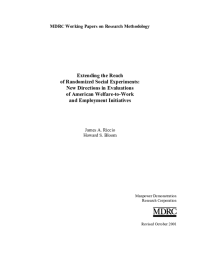Extending the Reach of Randomized Social Experiments
New Directions in Evaluations of American Welfare-to-Work and Employment Initiatives
Random assignment experiments are widely used to test the effectiveness of new social interventions. Part of MDRC's methodology work paper series, this paper discusses several major welfare-to-work experiments, highlighting their evolution from simple "black box" tests of single interventions to multigroup designs used to compare alternative interventions or to isolate the effects of components of an intervention. The paper also discusses new efforts to combine experimental and non-experimental analyses in order to test underlying program theories and maximize the knowledge gained about the effectiveness of social programs.







